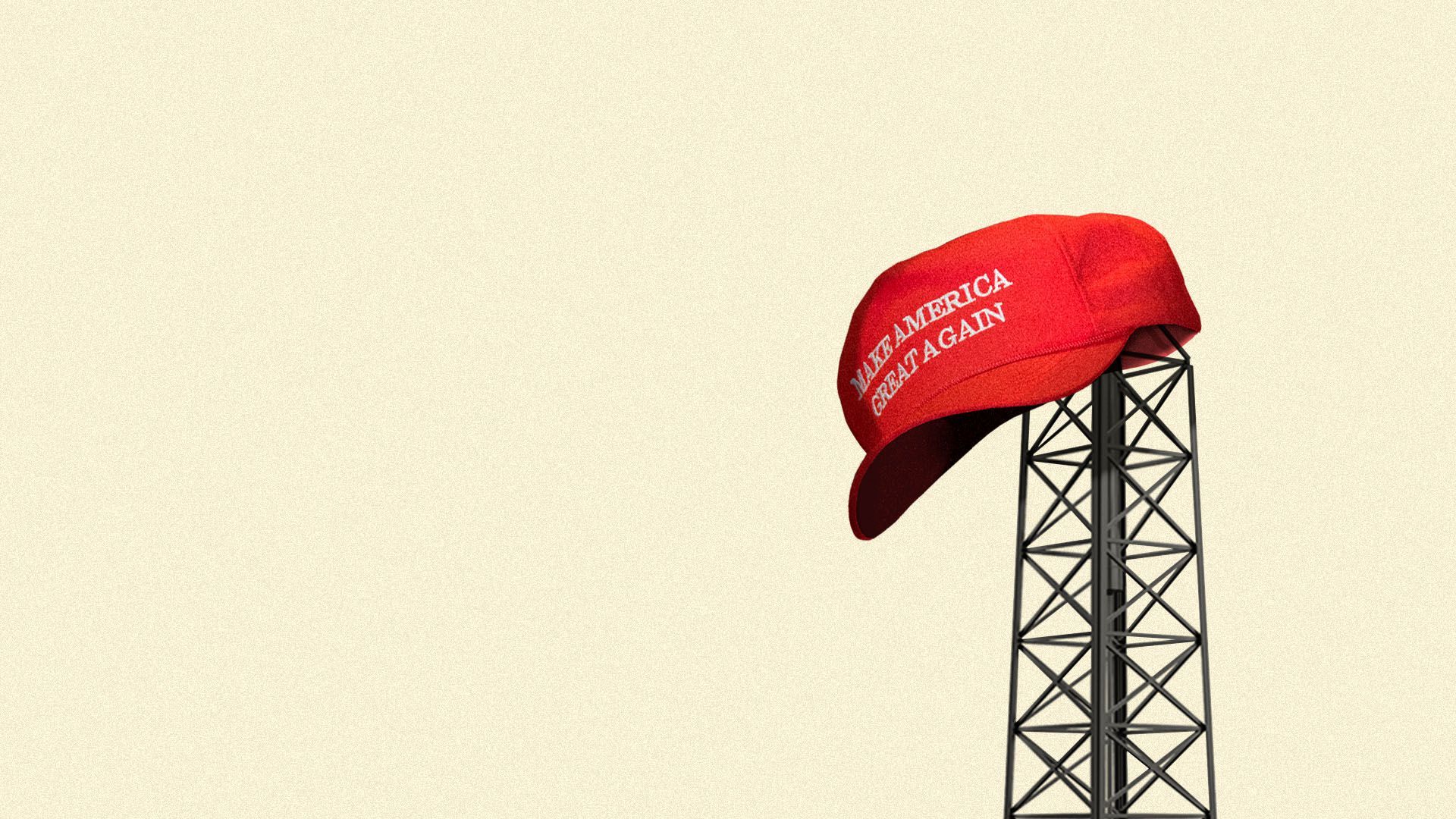Why the stars aligned for Trump on oil diplomacy
Add Axios as your preferred source to
see more of our stories on Google.

Illustration: Sarah Grillo/Axios
President Trump's re-election campaign is wasting no time touting his role in brokering the new global oil-cutting pact, which featured days of direct talks with leaders from Russia, Saudi Arabia and Mexico.
Reality check: Trump's petro-diplomacy was important, yet just one of many forces that pushed Saudi Arabia and Russia toward reviving their cooperation on supply management, analysts say.
Why it matters: Trump's team is seeking a political lift from the deal, which the president himself has repeatedly touted via Twitter and during his press briefings.
- His campaign yesterday circulated a release boasting that Trump "delivered results" for energy sector workers and is "protecting millions of American oil and gas workers from further harm."
Catch up fast: OPEC+ reached a final agreement Sunday to cut production by 9.7 million barrels per day for two months beginning in May, with shrinking but still-large cuts slated to continue through April of 2022 (though they'll be re-assessed along the way).
- Additional curbs from some OPEC members, combined with declines in the U.S. and elsewhere due to market forces, increase the scope of production curbs by millions of barrels, but there's no precise tally.
What they're saying: "Of all the deals [Trump's] done in his life, this has to be the biggest and most complex. He had to be not only dealmaker but also divorce mediator, after the [OPEC+] relationship split up six weeks ago," energy historian Daniel Yergin said in remarks circulated to reporters.
But, but, but: Analysis from Yergin and other experts highlight deeper market and geopolitical forces beyond Trump's control that set the stage for the final agreement.
- "A lot of this deal is making a virtue out of a necessity. Storage was filling up. There weren’t buyers for this production," said energy consultant David Goldwyn at a virtual panel discussion hosted by the Atlantic Council yesterday.
The intrigue: RBC Capital Markets' Helima Croft, speaking at the same event, said Trump's intervention "changed the trajectory" of the crisis.
- But she also noted that the Saudis had wanted to avoid the prior OPEC+ rupture in early March, pointing out it was Russia who balked at additional cuts.
- Flash forward, after flexing their muscles in the price war, the Saudis wanted a big reduction, so they were willing to tolerate only a loose U.S. commitment. “I think the stars aligned because they wanted that cut from the beginning,” she said.
Between the lines: Another panelist, Russia expert Anders Åslund, pointed to internal power shifts in Russia that helped set the stage, arguing that Rosneft CEO Igor Sechin lost some influence with Russian President Vladimir Putin.
- “It was only Sechin among the oil executives who wanted to have this price war,” he said.
Another aspect is that Saudi Arabia is vulnerable to U.S. pressure right now, which GOP lawmakers sought to exploit as they also pushed the Saudis to cut.
What's happening: In recent days and weeks, these lawmakers have not-so-subtly reminded the Saudis of their military reliance on the United States.
- Two U.S. senators from oil-producing states even floated legislation in late March to pull U.S. troops from the kingdom.
The big picture: “I do not know what cards [Trump] played with Saudi Arabia, but he has very very big cards to play," Rapidan Energy Group president Bob McNally said on the new episode of the Platts Capitol Crude podcast.
- "Trump is Saudi Arabia’s biggest friend in Washington at a time when Saudi Arabia needs friends in Washington,” he said.
Meanwhile, at that same Atlantic Council event (I'm getting lots of mileage from it!), Middle East expert Kirsten Fontenrose noted that Saudi Arabia has already lost standing with Democrats due to human rights concerns.
- “Prior to the price war, Republicans in the Senate prevented the passage of legislation intended to punish Saudi [Arabia], drafted by Democrats concerned about the humanitarian crisis in Yemen and other things,” she said.
- “If Republicans and Democrats agree on the need to teach Saudi [Arabia] a lesson, as it looks like what happened, then that legislation would fly through Congress,” Fontenrose said.
Quick take: Trump holds a lot of sway over the congressional GOP, so if the White House didn't want to see ongoing threats from lawmakers in recent weeks, they could have put a stop to it, and didn't.
